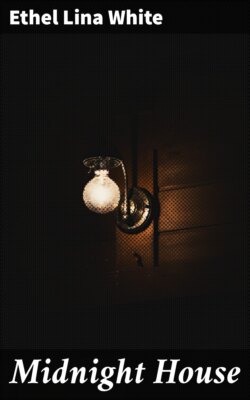Читать книгу Midnight House - Ethel Lina White - Страница 16
На сайте Литреса книга снята с продажи.
—V—
ОглавлениеTable of Contents
Murder. At the word, the horror which had been lurking under the surface of her mind suddenly flashed upwards with the snap of a shark.
Three days before, a woman had been murdered in Maundy Passage. The victim was a Mrs. Davis, the daughter of a local draper who was visiting her home-town. On the afternoon of the crime, she had gone to tea with an old friend at Vine Cottage. An hour later, her body had been found by a postman in the passage.
Except that there was no evidence of blood-lust or frenzy, the lack of motive suggested the attack of a lunatic; but there was no sign of a struggle—no bruises, no torn clothing, no superfluous blows. One scientific crack had felled her. Afterwards, her scarf had been knotted around her throat, so that she was strangled while unconscious.
She had not been killed for money, as her bag contained several notes. A gold watch and several good rings had not been removed. There was no hint of scandal or romance in her history—no lover or jealous husband.
The worst that could be said of her was that she regulated her life by the Gold Standard. She had always chosen her friends from among those who lived in a certain type of house and kept a requisite number of servants—but snobbery was hardly a sufficient cause for slaughter... Yet someone had slain a worthy wife and mother, leaving behind a murder mystery in the shape of a well-tended body in a grey squirrel coat.
It was this wanton element which terrified Elizabeth. To her, the murder seemed the impulse of a dislocated mind—a maniac chuckle materialised into an act.
As she looked at the excited children she wondered how they knew about the crime. The Pewters—brother and sister—had discussed it only when the door was shut. Geraldine had ordered all local newspapers to be burned. But since they knew, it was useless to perjure herself. The best she could do was to try and keep their adventure on a light level.
"There's an echo in this passage," she said. "If we race through it, we'll sound like galloping horses."
"No," objected Barney, with the importance of a courier. "We've got to find the cross. It was in the paper. And perhaps, if we are very creepy-quiet, we may see the murderer doing his stuff."
"I want to see the bloody-stains," chimed in Phil.
"Do you like being frightened, Philippa?" asked Elizabeth.
"Yes," admitted the child. "It's fun when you are safe with big people."
Although Elizabeth could not claim bulk, she realised that her adult status kept Phil in a zone of safety. Furthermore, she had to admit that she resembled the child to a certain extent, for she had thrilled over the newspaper account of the crime, when she read it in the warm, well-lit drawing-room.
Then it was so far away. And now she was actually entering Maundy Passage.
After the municipal lighting of Monk Street—economical though it was—they seemed to plunge into darkness, but after they had walked a few yards they could see light around the bend, glistening on high walls—weeping with moisture. The passage ran between the back-gardens of two rows of large houses and was broken, at intervals, by wooden doors. Although these looked too swollen by damp to be opened, some were stuck ajar, in evidence of the coalman's visit.
Everywhere was a confusion of shadows, shifting and racing over the walls in the flickering beam of lamplight.
Suddenly Elizabeth saw one of these detach itself from the darkness of a doorway. It assumed substance and shape as it swooped around the bend, disappearing like a quiver of dark lightning.
Gone almost before she could realise it, she was dismissing it as a trick of her imagination, when Barney started and made an instinctive effort to free his hand. Subduing her panic for his sake, she managed to speak to him in a natural voice.
"Barney, did you see that funny shadow?"
"No," he said quickly. "I didn't see it. I didn't see the black man. I didn't see anything. There's nothing there."
His denial shocked her severely. It helped to give solidity to a shadow, turning a monstrous illusion into a perilous reality. But what terrified her more was the change in the boy. While it was ridiculous to be afraid of a child, it seemed to her that he was her enemy.
His whole personality appeared changed from that of the adorable young tryrant, and even his appearance. His eyes were smaller as he looked up at her through narrowed lids while his expression was furtive.
He kept repeating his lie in a shrill unconvincing voice.
"You didn't see it. You are making it up. And Phil didn't see it; did you, Phil?"
"No," agreed Phil stolidly. "Nobody can see in the dark, except cats."
Suddenly the memory of Maxine's influence stirred in Elizabeth's mind, puncturing it like the fangs of a poison-snake. It made her fear the underground evil of a conspiracy which had ensnared Barney into some remote alliance with a murder.
She thought of the body in the grey fur coat which had lain in the passage three days before. At that moment, they might be standing on the spot marked with a cross...
Smitten with panic, she gripped an arm of each child and rushed down the passage—not stopping until they had reached the safety of their own doorstep.
